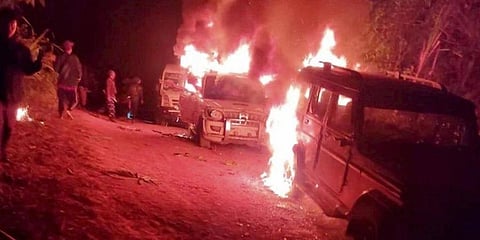

NEW DELHI: With the death of 14 civilians in Nagaland's Mon district earlier this month, the civilian casualties in the insurgency-hit North East states has reached a three year high, latest official data accessed by this newspaper shows. Arunachal Pradesh, Assam, Nagaland and Manipur all show a worrying trend of increase in incidents of violence, according to a report of the union ministry of home affairs (MHA).
Experts point out that the situation created by the spurt in violence, the protests over AFSPA following the Mon tragedy, and the inconclusive Naga peace talks that have been held off-and-on for the past six years, have caused the situation in the North-East to become more concerning.
However, there is some consolation to be drawn from the point of view of the law and order situation given that the numbers of militant surrenders and arms surrendered have already reached a three year peak in 2021. More insurgents have also been killed this year in North East. According to government data, 39 insurgents have been killed in the North East so far whereas the number of insurgents killed in 2020 and 2019 was 21 and 12 respectively.
According to a detailed report prepared by the Intelligence Bureau on the violence, deaths and surrenders in the North East, a record number of surrenders - 1448 - were made till November 30 this year, whereas only 112 and 158 people surrendered in the year 2020 and 2019 respectively.
The number of incidents reported till November 30 in North East states stood at 194, whereas the number of incidents that took place last year and in 2019 was 163 and 223 respectively.
There has been a sharp jump in civilian casualties as 33 people, including 14 in the recent incident at Mon district, have been reported so far this year. Last year, only three civilians were killed in insurgency related violence whereas the number stood at 20 in the year 2019.
As on November 30, Assam reported 11 civilian deaths in insurgency related violence whereas the number was 2 last year and there were no casualties in 2019, according to home ministry data.
In Nagaland and Manipur too, there has been a worrying spike in civilian deaths compared to 2020 when no such deaths took place. This year, 14 civilians were killed by the army in Nagaland’s Mon, whereas in Manipur nine civilians were reported killed in insurgency related violence so far. In 2019 as well, there were fewer civilian casualties in the two states with Manipur recording seven such deaths and Nagaland reporting one death.
A look at the casualties among security forces in the North East also reveals a similar pattern, with eight deaths reported so far this year in comparison to five deaths in 2020 and four deaths in 2019.
While violence has come down drastically in the North East over the last two decades given that 14 of the last 21 years recorded zero casualties among security forces, there is a sense among senior security officials monitoring the situation that the fresh spike in violence in the North East must be taken very seriously.
Security experts point out that the inordinate delay in the Naga peace talks which has been dragging on for the last six years after the Framework Agreement was signed between the NSCN (Isaac-Muivah) outfit and the government in 2015 is also a cause for concern, especially with tempers running high due to the Mon incident. Some experts believe that revoking AFSPA could be a way forward in calming the situation down in Nagaland and the areas around.
“Although, violence has dipped in North East over the years, the delay in Naga peace talks and some inappropriate remarks made by the former interlocutor RN Ravi has already caused a bit of heartburn and then this horrible incident has taken place in which innocent civilians have been killed,” said MP Nathanael, former IG of Central Reserve Police Force.
The officer who has served in the area also called for revocation of AFSPA arguing that such a measure would assuage the flaring tempers in the region. “It is high time that AFSPA be removed, now that there is a call for the same from the Chief Ministers of Meghalaya and Nagaland too. Removal of AFSPA will give a much needed sense to people that things have started improving in the areas where AFSPA has been in place for decades now,” Nathanael added.
While some others, including Lieutenant General Rameshwar Roy, former Director General of Assam Rifles, believe that there could be other ways to win the trust of the people in the North East other than revoking Armed Forces Special Powers Act.
“It is not AFSPA which needs to be re-looked into but it is the policy disconnect with the North-East that needs to be fixed. North East cannot be treated as a forgotten region of the country. Extra incentives need to be given to promote connectivity in the North East. Bodies like the Ministry of Development of North Eastern Region (DoNER), the North Eastern Council need to be more active because only when development happens, can the security situation improve in the region,” said Lieutenant General Roy.